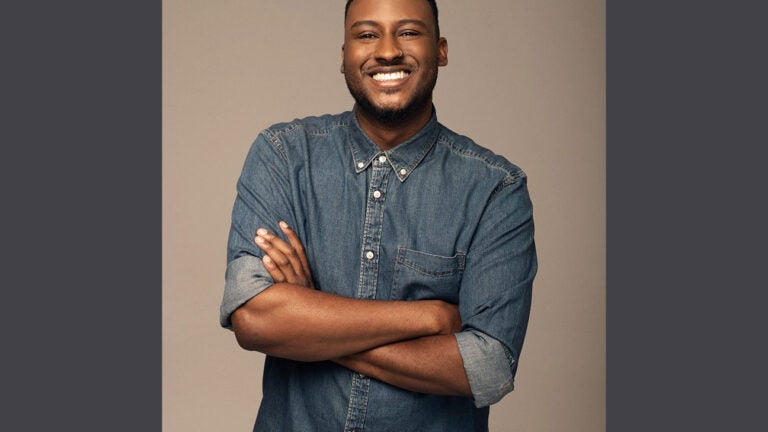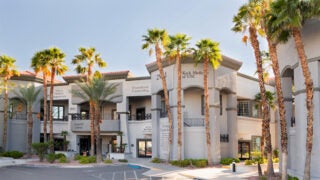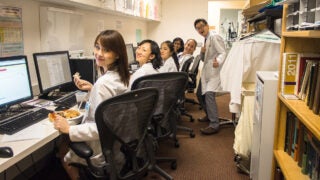
Meet Edwin Bodney, USC Student Health’s new LGBTQ+ campus advocate and educator
The poet and performer wants his art and his own experiences as a Black, queer undergrad to help guide underrepresented members of the USC student community.
As part of an effort to address populations at risk of gender-based harm, USC Student Health’s Relationship and Sexual Violence Prevention and Services office has recently recruited established educator and advocate Edwin Bodney as a violence prevention specialist. Bodney’s role is to work specifically in the LGBTQ+ community and is funded through a grant from the California Office of Emergency Services.
Edwin Bodney wants to listen.
USC Student Health’s new LGBTQ+ campus advocate and educator noted that he’ll be teaching workshops and developing programs for the USC student community, too. But first and foremost, he said, “USC students should come to me if they want someone to listen.
“So many of us walk around the world feeling unheard or invisible or silenced,” he added, “and I try to illuminate each person I engage with.”
The 30-year-old, who self-identifies as queer, is also a notable poet, performer and former host of L.A.’s Da Poetry Lounge who uses his work to make others feel heard. He answered a few questions for USC News.
What was your own experience as a queer undergrad college student?
I wasn’t as self-aware and spent a lot of my college time in survival mode, which isn’t an isolated experience for our community. I went to design school before getting my education degree. In art school, everyone is pretty gay, because that’s where all of us weirdos go and congregate. So that was comforting, but my issues were navigating class and race, which we know is really one and the same.
I was one of the only Black people in my classes, and I wasn’t around people who understood what it’s like to not have money. None of my identities take precedence over another. Intersectionality is about the compound experience. All of my work is intersectional. Having that awareness and being able to transform it into empathy allows me to listen better and anticipate the needs of others.
Research shows that members of the LGBTQ+ community experience gender-based harm at higher rates than other populations. How will your work at USC Student Health address this disparity?
Is it gender-based harm or power-based harm when it comes to this community? Gender is different and more fluid in the queer community. So, it’s more about a power-based dynamic. Traditionally, it’s man beats woman. It’s not so black and white in our relationships. All of us who are not trans have to do a better job advocating for trans folks because oftentimes they cannot pass through society unseen and are targeted for violence.
There is disproportionate harm done to the LGBTQ+ community, higher for femme and even higher for trans because society devalues the feminine. We need to shift the narrative of what it means to be femme and how important femininity is in the world.
It’s important to always be having these conversations. And I’m someone who can jump into the conversation as opposed to having to learn about the conversation first. I’m not speaking just from my education but my own experience, too. That makes me an asset as someone who is queer and Black, especially in an affluent environment like USC where most of the students don’t look like me. For those who can see themselves in me, they had to fight damn hard to get to USC.
The Advocate profiled you in 2018 for leading difficult conversations about racism within the LGBTQ+ community. How do you use your poetry and art as activism?
In my poetry, I really enjoy being vulnerable. I try to navigate my experience with people in a very direct and tender way, with more intimacy and honesty. I don’t think there’s enough of that in the world, and I want to contribute to a new narrative. Honesty in poetry and performance is a free power that doesn’t impose on others or take agency from them. It’s something I try to do in my poetry, my performance and my teaching style.
Why is it important to have a member of the Relationship and Sexual Violence Prevention and Services staff focused on the LGBTQ+ student community?
LGBTQ+ students don’t feel as safe or as represented as they’d like to be on campus at many campuses. To see somebody in my position, who comes from a life not so distant from theirs, is incredibly important in cultivating safety or bravery in general. I see that person who is speaking about their experiences and sharing themselves unapologetically. I hope that what the students leave with. I hope our LGBTQ+ students feel not just support but seen and amplified by folks in power or agency.
For example, I talk about when I finally got a gay doctor and how remarkable it was. I could come in and feel like I didn’t have to explain myself or define who I am first. It’s great to come into a space and see someone who, in a way, is you. I hope that my queer students and trans students on campus feel that way when I’m advocating for them and cultivating space for us.
How can USC students learn more about you or connect with you?
I’m the only person with this name in the world, so they can Google me to find my performances. If students care to, they can follow me on social media. It’s mostly me and my cat, Myko, arguing with each other, and I post a poem here and there. You can also reach out to me through USC Student Health’s Relationship and Sexual Violence Prevention and Services office.
The grant from the California Office of Emergency Services, with partnering organization YWCA of Greater Los Angeles, also provides for training and dedicated time from a Department of Public Safety officer to better serve the needs of this community. The program is part of a larger consortium group, the Coordinated Campus Response Team, which meets regularly to infuse best practices of care into existing frameworks of health care delivery.



